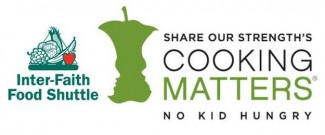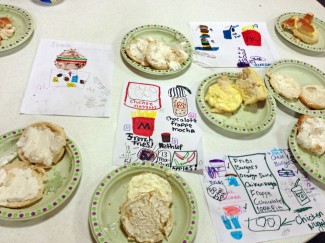Chances are you’ve eaten a meal from a fast food restaurant recently. That’s because 80% of Americans eat fast food at least once a month, according to Business Insider. But residents of a Food Desert (a low-income area where a significant number or share of residents live more than 1 mile from a supermarket in urban areas and more than 10 miles from a supermarket in rural areas) often eat fast food meals more often than the “average American.” That’s because in a Food Desert, such as the one in southeast Raleigh, the absence of grocery stores is compounded by the abundant presence of fast food restaurants.
And that takes a toll on health. 
Which is why IFFS teaches Share our Strength’s Cooking Matters courses, engaging families with limited resources in hands-on, skills-based classes about eating healthy on a budget. One class in each six-week course specifically addresses how to choose wisely when eating away from home.
“Cooking at home tends to not only be cheaper than eating out, but it also puts the families in control of what they are eating,” explained Becky Dobosy, IFFS’s Cooking Matters Satellites Coordinator. “When eating outside the home, it’s harder to determine exactly what you are consuming, especially when it comes to fat and salt intake. In the class we talk about little steps to making healthy substitutions and reducing portion size.”
‘Healthy Starts at Home’ is the Cooking Matters for Families lesson where parents and their children learn the basics of reading nutrition labels and then have the chance to visualize the nutrition information for common fast food meals through the ‘Blubber Burger’ activity.
Kids start by drawing pictures of fast food meals the kids would normally order. Then, using nutrition facts, everyone calculates the total fat in the meals they drew.
Next the kids grab a hamburger bun and a tub of crisco and, using the equation 4 grams of fat = 1 tsp, measure out the total fat from their drawing onto a real life hamburger bun. It creates quite an impressive visual!
“In my experience coordinating Cooking Matters classes, hands-on learning is the most impactful with the kids,” said Dobosy. “Including a hands-on activity that lets them explore and experience a lesson makes them much more likely to remember it.”
The children then have the opportunity to tell their parents what they've learned.
“The kids are always shocked and grossed out by seeing the amount of fat in their meal represented by the blubber burger,” said Dobosy. In our families class they are very excited to share what they learned with their parents, and their parents are equally surprised.”
The lesson concludes with families learning how to prepare Baked Flaked Chicken with Sweet Potato Fries as an alternative to fast food for dinner.
“Now that families know how much fat is in their favorite fast food items, they will start making changes to the way they order,” said Dobosy. Many of the participants make goals to swap fries with side salads, avoid sugary sodas, or eliminate their consumption of fast food altogether.”
If you would like to learn more about Cooking Matters or are interested in teaching classes (in either English or Spanish), contact Fiffi Negussie at CookingMatters@FoodShuttle.org
----------
By Lindsay Humbert, IFFS Digital Media Spcialist. Contact: Lindsay@FoodShuttle.org
